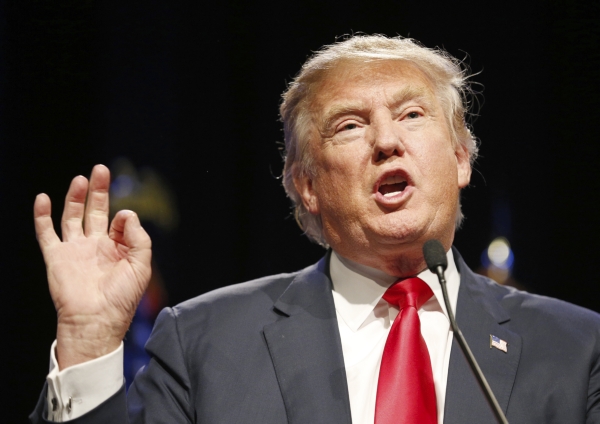The Republican storm
Published 9:08 pm Monday, February 22, 2016

- Republican presidential candidate Donald Trump speaks at a rally in Las Vegas. (AP Photo/John Locher)
By David M. Shribman
Tribune Media Service
The character of the Republican Party is in the throes of a difficult, dramatic overhaul. The purpose of politics is undergoing a fundamental transition. The values the electorate celebrates have shifted substantially. And one more: Nothing like this has happened in a dozen decades
These are but a few of the stark and startling conclusions that are unavoidable from South Carolina’s bruising primary.
Make no mistake. The party that at its meekest moments (the Dwight Eisenhower years) offered milquetoast echoes of the Democratic agenda — and at its most muscular interludes (the Reagan revolution) still operated within the conventional constraints of politics — has entered a new phase, symbolized by the ability of an unfiltered outsider like Donald J. Trump to prevail in triumph while a refined insider like Jeb Bush retreats to the sidelines in humility, if not humiliation.
In the old days, the quiet conciliator could invite the young rebel onto his ticket, as the gray Eisenhower did with the red-hot cold warrior Richard Nixon in 1952; and the crusading ideologue could invite the cultivated rival onto his team, as Ronald Reagan did with George H.W. Bush in 1980. But breathes there a soul who can conceive of Trump offering his running-mate hand to the younger Bush, whom he disparaged mercilessly and contemptuously? And is there the merest chance that Bush, whose father in his gracious inaugural address of 1989 spoke on the West Front of the Capitol of the “age of the offered hand,” would accept it?
To ask the question is to answer it, and to acknowledge that the Capitol itself has become a venue of clashing storm fronts, with the isobars so skewed that they have created a political climate where compromise is devalued and acts of intransigence are irresistible.
The Democrats have contributed to this version of climate change, but the 100-year storm — actually a 120-year storm — is in the GOP.
Democrats have seen figures like Hillary Clinton and Bernie Sanders before; they may claim demographic differences — one a woman, the other a Jew — but these two are only contemporary versions of Edmund Muskie (a senator and secretary of state) and George McGovern (a populist from a rural state, and indeed the 1972 population of South Dakota and the 2016 population of Vermont are eerily similar).
But the Republicans have never seen any figure, let alone a White House front-runner, remotely like Trump.
Not evenBarry Goldwater, whose takeover of the party in 1964 is oftentimes employed in comparison.
The differences between Goldwater and Trump are manifold. Both were successful businessmen, and both have ties to Phyllis Schlafly, perhaps the most durable figure in American history — ever. Schlafly, now 91, wrote “A Choice Not an Echo,” a pro-Goldwater manifesto that was a remorseless attack on Nelson A. Rockefeller and his brand of moderate Republicanism. This year she endorsed Trump, saying he represents “everything the grassroots want.”
But the similarities end there. Goldwater was in the Senate for nearly a dozen years when he won the party’s nomination and argued that extremism in the defense of liberty was no vice. Trump has never held office nor offered an overarching credo.
Goldwater offered a way of thinking about the world — serious and searching, highly discomfiting to the great majority in those Lyndon Johnson Great Society days who occupied the ideological ground outside conservative circles. Trump offers a way of talking about the world — offhand and impulsive, highly discomfiting to all but a third of the electorate.
Trump’s opponents might argue that Goldwater offered policies while Trump offers prejudices, but in truth the Goldwater view of politics had a water-tight coherence (it allowed the Arizonan to be one of only six Republicans to oppose the Civil Rights Act and yet not be tarred as a racist), while Trump’s set of views are a Whitman’s Sampler of aphorisms and thrusts that his conservative rivals have been able to portray as inconsistent or contradictory.
Why is this happening in the Republican Party? Why now?
That is the ultimate political question of the age, and — attention college professors! — a superb final-examination essay to set for courses on modern political parties. Political scientists will be examining this for decades, and their answers may include some combination of the following: the eclipse of the Reagan conservatives, whose work was basically concluded with the fall of Communism; persistent impatience with government; and the comfort religious conservatives have found within the party, especially after the 2000 election of one of their own, George W. Bush.
It also may include the coming of age of a new generation impatient with the assumptions of the political establishment, or, more likely, the powerful counterrevolution of those left behind by the tech boom, left unemployed by the Midwestern industrial collapse, left impoverished by the economic crisis of 2008, left resentful that the ladder of social mobility is tottering. Or it may simply be the raw appeal of Trump himself.
But nothing like this has happened since William Jennings Bryan won the Democratic nomination in 1896. That was history, and so is this.
David M. Shribman is executive editor of the Pittsburgh Post-Gazette.

